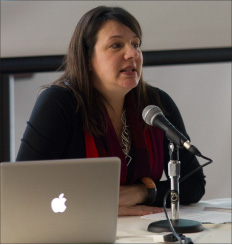
By Julie Garrison
Correspondent
Marla Jaksch, assistant professor of women’s and gender studies, has been taking advantage of digital technology for the past two years in an effort to collect the stories of Tanzanians and South Africans affected by the racial persecution of apartheid.
On Thursday, Feb. 24, Jaksch presented this effort, known as the Virtual Freedom Project, to students and faculty in the Business Building lounge during a politics forum titled “Current Debates on the Development in Sub-Saharan Africa: Gender, Culture, and Heritage.”
“The idea is that it will be a unique way to explore the relationship between Tanzania and South Africa in relation to the freedom struggle. It will look like a virtual museum with 3-D dimensions, records, images, maps, text and so on,” she said.
Jaksch said she is working with Hamilton College professor Angel Nieves on the project and thinks it will take approximately four years.
“The use of new media in connection with apartheid hasn’t really been explored yet,” Jaksch said.
The Virtual Freedom Trail is a major component of the Virtual Freedom Project. It consists of two parts — Jaksch described the first part as “a virtual museum,” while the second part will be a virtual book.
Many challenges face the implementation of the Virtual Freedom Project, including illiteracy, especially among women, as well as the want of basic needs like food and water, Jaksch said. The fact that many inhabitants of the region are unfamiliar with current digital technology only compounds the problem.
“New tools for publication must be disseminated across the Diaspora,” she said.
Another problem is the availability of informational resources.
“South African documents associated with apartheid (are often) destroyed, (which is) not the case in Tanzania, where (they are) untouched,” Jaksch said.
There are other complications in Tanzania, however, including a prolonged drought and the presence of “over 125 ethnic groups in that area,” according to Jaksch.
Nevertheless, cultural preservation is seen as a necessity by the majority of Tanzanians.
“Most Tanzanians agree that cultural preservation is essential,” she said.
Cultural preservation can be a challenge, Jaksch admitted, where people are struggling to meet basic needs. Another stumbling block, she said, is that many Westerners lack faith that the money they donate will actually make it to those in need.
“Popular discourse (suggests) that millions or billions of dollars have done little to address systematic poverty,” Jaksch said. Corruption at home and abroad over the past few decades has cemented this idea in the popular conscience, she said.
There are also concerns about how many underprivileged people would realistically have access to the stories collected in the Virtual Freedom Project.
“It does bring up a lot of questions about who’s accessing the information,” said Allie Axel, senior sociology major. “If it’s the more privileged people accessing the information, what’s it doing for the culture?”
Still, Jaksch said that many stand to benefit from the project’s virtual bridge.
Women are often the most marginalized and disenfranchised of all due to low literacy rates and a lack of reproductive choice, she said — by participating in the Virtual Freedom Project, they could gain a sense of agency over their stories and therefore their lives, and with it a sense of freedom.






